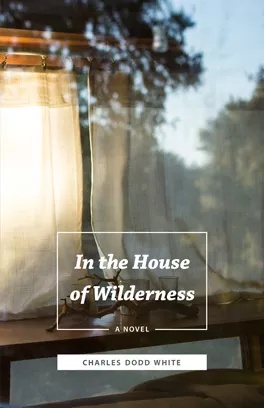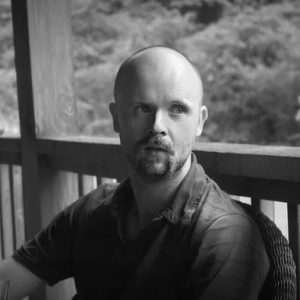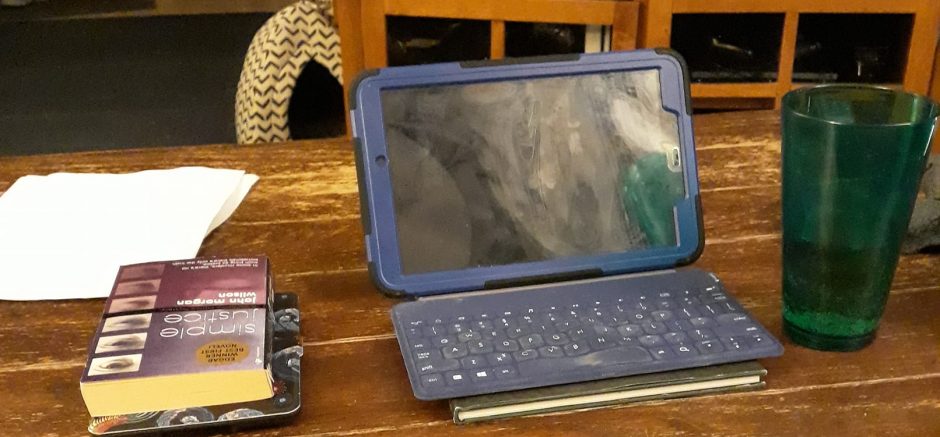 What were the originating images in this novel? I imagined as I was reading it had to be the opening eight pages, where you set up the conflict beautifully, but I'm prepared to be wrong, as you could have written the Stratton chapters first.
What were the originating images in this novel? I imagined as I was reading it had to be the opening eight pages, where you set up the conflict beautifully, but I'm prepared to be wrong, as you could have written the Stratton chapters first.
Yeah, I was really drawn in by this idea of three very different people traveling together through a kind of overwhelming landscape. I actually spent a year commuting along that stretch of interstate that passes from western North Carolina into east Tennessee, largely in the predawn hours, so it was natural to lull into a kind of dark imagining. In a very real sense, the land gave me the story. Also, I was in the process of moving into a new state for a job and the idea of home and how that can change at different points in a life was very much on my mind as well. Those two elements naturally coalesced into what became the central conflict of the book.
When did you realize you were pitting the triumvirate–Wolf, Winter and Rain–so baldly against against convention, and what did it mean for the book, particularly for Rain,? Was it a process of discovery, this novel, or the fulfillment of a plan? It all seems inevitable, as it ought to, though not in the ways you expect, which is what I read for, mostly.
That opposition was there from the start. Part of it was my sense of the duality of wilderness. For me that word has psychological as well as physical implications, which is at the heart of the paradox in the novel’s title, i.e. how can a structure manage to be truly wild? I think Rain is the most dynamic character in the story, largely because she defies what the men around her want her to become. Yet, she still lives within a very real world that shapes how we think, feel, and act. So there’s a sense of what things must be confronted, but her sense of self makes that something that’s not necessarily easy to pin down.
What made you decide to pair up Stratton and Rain? I talked about it with my wife as I read, which I don't usually do, wondering how you were going to make it work, which I hasten to say, you did, very well.
I didn’t want it to become a clichéd May/December pairing that populates so many stories. This was about finding something of value in another person without the formula of a conventional romance. So, their convergence needed to be inextricable tied to the land. Their way of being and knowing is drawn directly from that fact.
I dig the references throughout, to the Garden and Gun article about the dog with cancer, and the Jason Isbell/DBT, and the classical music references. They give the book a good contemporary feel, but I wonder, do you worry about dating your material? Or do you just count on having picked up on the good stuff and the good stuff lasting?
I think it’s just a matter of telling the specifics of the world I care about. Good novels should document the world they’re trying to portray. If you worry about how people might react to your work down the line I’m afraid you can become too self-conscious. That’s the big danger in getting involved too deeply in writing workshops/groups. You start writing to please a certain group when you should be writing to confront them.
On page 113, Loyal acknowledges his trouble with women via the baby. A nice moment, and funny. He provides a nice counterpoint to Stratton. Did he always have as large a role to play, or did he grow into it with the writing?
He grew out of the editing decisions. That scene, as well as others, came out of a direct conversation with my editor, Gillian Berchowitz, about who he was and why he mattered to the rest of the book. I’m really grateful for this because it’s unusual to have such a thoughtful and incisive reader. I really can’t thank her enough for making the novel the best version of what it could be.
Page 117. I cringed a little at 'Obama the Reneger." Seeing those things are part of the landscape, and I find Stratton's politics interesting, though maybe not surprising, given his occupation. His university friends seem more conservative, but he doesn't. Were you setting up opposing viewpoints, or was it just the way Stratton rolls? He seems like a maverick to me.
I think he’s fairly typical for someone teaching college in Southern Appalachia. He’s a Democrat, but he also likes to drink whiskey and fish and camp. I think it seems weird to those on the outside that you can have progressive politics and a rich cultural life through the educational world while still enjoying the best parts of the rural experience. The conflict, of course, is when the unforgivably racist and jingoistic garbage turns up, which it does in very direct ways, and men like Stratton have to find a way to hold on to the things they care about while still charting an ethical course for themselves.
Liza fascinated me throughout the book, someone the whole novel turned around, someone we know well, yet she's never in the book as a POV character, though her photos stand in for her. Stratton's loss is palpable, though, on nearly every page he appears. Can you talk about her, and the decisions you made about her? Was she always in the book, or did the idea develop as you wrote?
Liza was meant to be a ghost, but like all ghosts she was there to shape the world by her absence. Despite never appearing in the “now” of the story, she is a crucial part of it. Not only for Stratton but Rain as well. I thought this was an interesting dynamic that tried to show what deep grief does to people, even those to whom they’re indirectly connected.
Wolf reminds me of the old man, Wade, in Larry Brown's Joe, but where Wade was just plain evil, almost a caricature, Wolf is someone more complicated. Did you worry throughout about that, about making someone so bad, so charismatic at the same time?
I think most of my baddies are like this. It’s like Milton’s Satan. How convincing would he be if he failed to seduce the reader with his heroic rhetoric? I think it’s perilous to underestimate evil, to try to reduce it to something that’s facile. When you do that you lose an awareness of how threatening it can be.
The ending reminds me of the best kind of inevitability, the knowledge that no matter how things go, they can always get worse. Yet there's some hope too, as there ought to be but often isn' t (I've been reading a lot of noir lately). Without revealing the ending, I'd say it's hopeful, but complicated. How would you describe it?
I think, like in all stories, things have to change to remain interesting.
Did you have other books you were in conversation with during the writing of this novel? What kind of book do you think you set out to write, and what did you end up with?
I think those conversations are ongoing. There’s clearly some McCarthy and Larry Brown in there, but also some Carson McCullers, James Salter, and Bonnie Jo Campbell. If you’re not thinking about other books as you work, even on a subliminal level, I think you’ve traded away a significant piece of what you’re trying to do.
 Charles Dodd White lives in eastern Tennessee. He is a recipient of the Thomas and Lillie D. Chaffin Award for excellence in Appalachian Literature, a Jean Ritchie Fellowship from Lincoln Memorial University, and an individual artist’s grant from the North Carolina Arts Council. He is author of the novels, IN THE HOUSE OF WILDERNESS (Forthcoming 2018), A SHELTER OF OTHERS (2014), LAMBS OF MEN (2010), and the story collection, SINNERS OF SANCTION COUNTY (2011). He is also editor of the contemporary Appalachian story anthologies, DEGREES OF ELEVATION (2010) and APPALACHIA NOW (2015). His work has appeared in Red Holler: Contemporary Appalachian Writing, Walk Till the Dogs Get Mean: Meditations on the Forbidden from Contemporary Appalachia, Appalachian Heritage, The Louisville Review, North Carolina Literary Review, The Rumpus, Tusculum Review and others. He is an Associate Professor at Pellissippi State Community College in Knoxville, Tennessee.
Charles Dodd White lives in eastern Tennessee. He is a recipient of the Thomas and Lillie D. Chaffin Award for excellence in Appalachian Literature, a Jean Ritchie Fellowship from Lincoln Memorial University, and an individual artist’s grant from the North Carolina Arts Council. He is author of the novels, IN THE HOUSE OF WILDERNESS (Forthcoming 2018), A SHELTER OF OTHERS (2014), LAMBS OF MEN (2010), and the story collection, SINNERS OF SANCTION COUNTY (2011). He is also editor of the contemporary Appalachian story anthologies, DEGREES OF ELEVATION (2010) and APPALACHIA NOW (2015). His work has appeared in Red Holler: Contemporary Appalachian Writing, Walk Till the Dogs Get Mean: Meditations on the Forbidden from Contemporary Appalachia, Appalachian Heritage, The Louisville Review, North Carolina Literary Review, The Rumpus, Tusculum Review and others. He is an Associate Professor at Pellissippi State Community College in Knoxville, Tennessee.





